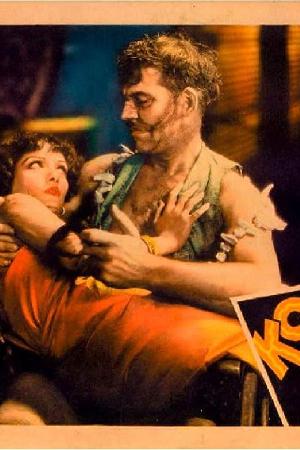
Kongo (1932)
- 6.6
- 85 mins
- Horror
Storyline
This remake of West of Zanzibar (1928) made four years later tries to outdo the Lon Chaney original in morbidity. From a wheelchair a handicapped white man rules an area of Africa as a living god. He rules the local natives through superstition and stage magic and he rules the few white people through sadism, keeping them virtual prisoners. He lives for the day he can avenge himself horribly on the man who stole his wife and crushed his spine. Strong and macabre stuff in a nearly forgotten horror film.—Mark Leeper
Plot Keywords
wheelchair, cape town south africa, drug addiction, paraplegic, voodoo, humiliation, revenge, alcoholism, torture, degradation, obsession, self sacrifice, regeneration, escape, held captive, sorcerer, brandy, africa, bare chested male, hairy chest
Short Review
My god, this is a dark movie. I loved it (lol). I'm not sure if it's a guilty pleasure, if I was mesmerized by Walter Huston's fantastic performance, or if it was just how far it pushed pre-Code boundaries; probably all of the above. Huston plays a bitter paraplegic hell-bent on vengeance on the man who crippled him, stole his wife, and then had the nerve to sneer about it (C. Henry Gordon); it's that last bit that really seems to irk him. When the movie opens he's already been in a jungle camp for 18 years, slowly plotting his revenge, and in the meantime, exerting absolute control over the natives via magic tricks, a semblance of their voodoo, and understanding their language. He also exercises absolute control over his 'Portuguese' lover (Lupe Vélez) and two hapless assistants (Mitchell Lewis and Forrester Harvey), ruling them with an iron hand and perpetual scowl.A key part of his revenge is to degrade Gordon's daughter (Virginia Bruce), who has been in a convent all these years, unbeknownst to Gordon. Huston sends for her, but along the way, forces her into prostitution and alcohol addiction. We don't really see her being essentially raped, but it's alluded to, and by the time we do see her, she's his prisoner, filthy and degraded. Enter a travelling doctor (Conrad Nagel), who has problems of his own - a serious addiction to the dreaded "byang root". All of the characters in the film openly have corrupt sides to them. It's made clear that Vélez is promiscuous with the two assistants, and with Huston himself, trading sexual favors for alcohol and gifts. She's scantily clad and practically spills out of her top in several scenes. Aside from the depravity Bruce is subjected to, there are several other disturbing scenes - human sacrifice, the threat of tearing out a tongue with a wire, and burying a man up to his neck with leeches on him. These things aren't shown, but director William J. Cowen is effective in making us squirm. Unfortunately, amidst all of this entertaining pre-code sex, violence, and drug use, there is also racism in the vein of Joseph Conrad's 'Heart of Darkness'. Whether someone is white or black is regularly brought up, and it's pretty clear that people in the latter category are viewed as lesser creatures, beings that are childlike and superstitious, but also dangerous and potentially violent. Huston talks to the natives in heavily broken English often, and they appear with stereotypical adornments, like bone rings through the nose. Early on, Vélez gives a withered old native a bottle of kerosene to drink instead of alcohol, and refers to him as an "old monkey". Mercifully there aren't too many other direct comments like that, perhaps mainly because the natives end up being in the background of the story - but they are always present, surrounding this jungle outpost, and one feels a constant hum of racism in the context for the story.It's as if all of these very dark aspects of humanity in the story are enabled because of the context - here in this bleak jungle, where "civilized" behavior breaks down. What a contrast there is in the scenes in the convent Bruce lives in before being sent for, and in the only other non-jungle scene (being vague here on purpose). The story is about how twisted a man can get because of a raging desire for vengeance, and how much darkness he can cast over everyone around him, but the unleashing of those dark forces seems intertwined with his being in the jungle, and essentially part of native life there. There is a saving grace in his observation to his nemesis that "The color of your skin don't count with me. No black ever did me the dirt white man has," but it doesn't undo what comes before it.And yet, despite these problems, I confess I liked the film. Huston is wonderful, and the epitome of a soul warped by bitterness, like Ahab. The action is salacious and a bit trashy, something that would repel me in a modern film, but which I'm drawn to in these old films (I know it's a contradiction). I liked seeing Vélez, she has such a playful presence, and Bruce, Nagel, and Gordon are all solid as well. The original film, Tod Browning's 'West of Zanzibar' (1928) is frankly the better told tale - clean and taut, and avoiding several of the more lascivious aspects here (the drug use, tongue pulling, leech burial, at least some of the racial overtones, and Velez's character entirely) in order to give us the story from the beginning. As an aside, it was interesting to see some of the shots from that film and the props re-used. Regardless though, if you're in the mood for something dark, they're both worth seeing, and 'Kongo' will have you cringing for both good and bad reasons.
Trailer
Streaming Service
1. Amazon Video : Rent from $1.99, Or $0.00 with a Prime membership
